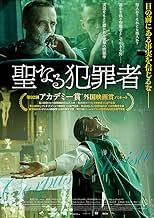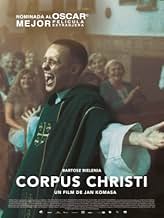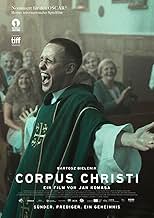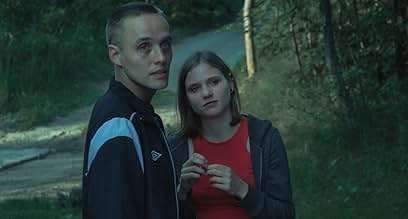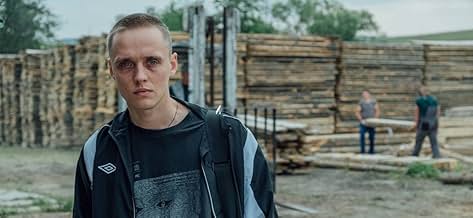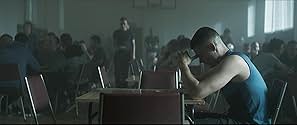AVALIAÇÃO DA IMDb
7,7/10
23 mil
SUA AVALIAÇÃO
Daniel experimenta uma transformação espiritual em um centro de detenção. Embora seu registro criminal o impeça de concorrer ao seminário, ele não tem intenção de desistir de seu sonho e dec... Ler tudoDaniel experimenta uma transformação espiritual em um centro de detenção. Embora seu registro criminal o impeça de concorrer ao seminário, ele não tem intenção de desistir de seu sonho e decide administrar a paróquia de uma cidade pequena.Daniel experimenta uma transformação espiritual em um centro de detenção. Embora seu registro criminal o impeça de concorrer ao seminário, ele não tem intenção de desistir de seu sonho e decide administrar a paróquia de uma cidade pequena.
- Indicado a 1 Oscar
- 56 vitórias e 39 indicações no total
Avaliações em destaque
Peter is a man with serious character defects who has been released from a juvenile facility. He finds himself at a small town Catholic church where he dons a priest's collar and becomes a beloved charismatic leading his adoring flock. The Polish Peyton Place slowly reveals its' secrets as the good "father" hears confessions from the flock and performs masses with inspiring homily's. As a lapsed Catholic, I found the film very realistic and sentimental. The lead actor is excellent and I would place it just behind "Parasite" as the best foreign language movie of 2019.
... that's for sure, but some are more forgiven for their immoralities than others, regardless of their affect and intent. Many stones thrown in this intense and emotional story of deceit from Poland that will exercise your own moral compass on the actions of the unrighteous.
This film could easily slide into an anecdote about a disguise that causes real change. However, it is a perfectly told film that asks important questions about the place of spirituality in a person's life, and about the chance to make amends. Contrary to being embedded in the reality of the Catholic Church in Poland, it is a universal challenge for viewers who are not afraid to check whether a bad person can do good things and what is the value of spiritual transformation committed for low motives. Greatly played by a couple of young, yet experienced actors Eliza Rycembel and Bartosz Bielenia, while the rest of the cast creates a perfect background for the small-town world, which, although on the outskirts, is not a province.
Always disturbing but also worrying and even intermittently amusing, this drama unfurls a religious parabola that is distinctly Polish but open to everyone. Bartosz Bielenia, an actor with blazing blue eyes and the ability to be so still, it's as if he can freeze the frame on his own, stars like Daniel, a young ne'er from Warsaw who is in juvenile detention for crimes only later revealed. He was first seen watching the gate as some teenagers in a metalwork class brutalize a boy while the guard is out, but sheer luck opens another door for him. Drawn to religion but not allowed to join a seminary due to his criminal record, he travels to a rural town once he has been paroled in a sawmill to take up work. A little gray lie allows him to take the identity of the young new priest, Tomasz, that the city expects, and soon Daniel will perform mass and hear confessions, while the old resident curate will drip out in rehabilitation for a while. Around this midpoint, the movie risks sounding like an episode of Father Ted as directed by Robert Bresson, as Daniel / Tomasz gets used to being looked after by bossy matron Lidia (Aleksandra Konieczna) in luxurious new digs and gets to know the city folk. The plot takes an interesting turn when Daniel learns that the family has been traumatized by a horrific road accident and discovers an uncommon pastoral ability when he tries to help restore the battered psyches of the bereaved-many of them barely younger than himself, including the pretty teenage daughter of Lidia, Eliza (Eliza Rycembel). All the above may lead you to expect some sort of soppy redemptive course, but that's not where this film ends up, landing on a much darker, reflective note instead. The blue-tone cinematography of Piotr Sobocinski enhances the rapturous atmosphere and enhances suspense in a smartly written, disturbing job.
A simple plot summary (Juvenile delinquent poses as priest, transforms village) does not begin to describe the nuanced and complex moral dilemma explored in "Corpus Christi," Poland's 2019 entry into the Oscar race. Violence, nudity, sexuality, and vulgarity--that in another film might seem gratuitous--here remind us that the world is full of angry people whose religiosity is more rooted in revenge than redemption. The central question: Is the road to love, forgiveness, and salvation more navigable when mapped by a man who wills himself into the priesthood and defies blind obedience than it is when directed by soulless compliance? Prepare yourself for a shocking and perplexing answer. Extraordinary performances, direction, and cinematography.
Você sabia?
- CuriosidadesA fictional story but based on a book exploring the surprisingly common multiple stories of clerical impostors in Poland, a phenomenon more prevalent than even the film-makers themselves expected. Most of Corpus Christi was shot in a remote village in the Carpathian foothills, where the crew soon began to feel that locals were a little cagey when the film's topic was broached. It was only when the shoot was over that they discovered that the village had its very own real history of a bogus priest. The impersonator had gotten away with it for two years before being rumbled.
- ConexõesFeatured in The Oscars (2020)
Principais escolhas
Faça login para avaliar e ver a lista de recomendações personalizadas
- How long is Corpus Christi?Fornecido pela Alexa
Detalhes
Bilheteria
- Faturamento bruto nos EUA e Canadá
- US$ 127.240
- Fim de semana de estreia nos EUA e Canadá
- US$ 4.632
- 16 de fev. de 2020
- Faturamento bruto mundial
- US$ 9.943.901
- Tempo de duração
- 1 h 55 min(115 min)
- Cor
- Mixagem de som
- Proporção
- 2.39 : 1
Contribua para esta página
Sugerir uma alteração ou adicionar conteúdo ausente

![Assistir a Trailer [OV]](https://m.media-amazon.com/images/M/MV5BNjE0ZDQ4MDMtOWQzMy00NTUzLWExNzYtOWJlNGExNjBlYzAxXkEyXkFqcGdeQXRyYW5zY29kZS13b3JrZmxvdw@@._V1_QL75_UX500_CR0)

